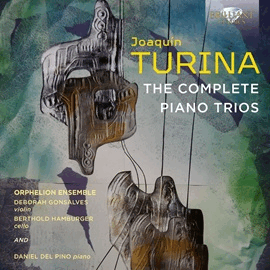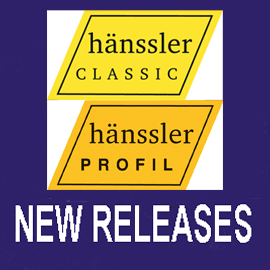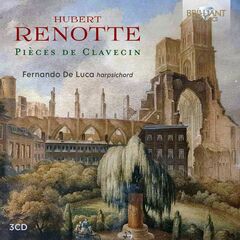Der belgische Komponist Hubert Renotte wurde am 24. Februar 1704 in Lüttich getauft. Doch mehrere Musikwissenschaftler geben als sein Geburtsjahr 1694 an.Renotte war von 1722 bis 1730 Organist an der Liebfrauenkirche in Maastricht. Danach war er nach einigen Quellen Kantor in Tongeren, nach anderen Kantor an der Martinskirche in Lüttich.
Von 1735 bis 1745 war er Organist an der Kathedrale St. Lambertus in Lüttich. Er ist der Komponist von Cembalostücken, Triosonaten und katholischer Kirchenmusik. Wie viel davon in Maastricht entstanden ist, ist unklar. Die gedruckten Veröffentlichungen stammen alle aus seiner Lütticher Zeit, sind aber heute nur wenig bekannt. Dies gilt nicht nur für die Orgelmusik, sondern auch für die Cembalostücke, die auf dem vorliegenden Album zum ersten Mal auf Tonträger zu hören sind. Sie sind im französisch-italienischen Stil komponiert, virtuos und von größtem Raffinement.
Auf dieser Aufnahme spielt der 1961 in Rom geborene Fernando de Luca eine moderne Kopie eines Blanchet-Cembalos aus dem Jahr 1754 von Claudio Capone.
De Luca ist Cembalist, Organist, Lehrer und Komponist. Von 2004 bis 2021 hatte er den Lehrstuhl für Cembalo am Pierluigi da Palestrina-Konservatorium in Cagliari inne. Seit 2021 ist er auf demselben Lehrstuhl am Konservatorium Antonio Vivaldi in Alessandria.
Es gibt viel zu bewundern an diesem Aufnahmeprojekt. Angesichts der Fülle an Werken – es sind ihrer sechzig – wird der Hörer mit Freude einige Suiten hören und später gerne zu den anderen zurückkehren, um sich von Renottes einfallsreicher Musik und De Lucas spontan und fantasievoll wirkendem Spiel begeistern zu lassen.
The Belgian composer Hubert Renotte was baptised on 24 February 1704 in Liège. However, several musicologists give his year of birth as 1694.
He was the organist at the Church of Our Lady in Maastricht from 1722 to 1730. According to some sources, he then became cantor in Tongeren, while others claim he was cantor at St Martin’s Church in Liège.
From 1735 to 1745, he was the organist at St Lambert’s Cathedral in Liège. His compositions include harpsichord pieces, trio sonatas and Catholic church music. It is unclear how much of this was written in Maastricht. All of the printed publications date from his time in Liège, but they are little known today. This applies not only to the organ music, but also to the harpsichord pieces, which are presented here for the first time. Composed in the French-Italian style, they are virtuosic and of the utmost refinement.
For this recording, harpsichordist and composer Fernando de Luca, born in Rome in 1961, plays a modern copy of a 1754 Blanchet harpsichord by Claudio Capone.
De Luca is a harpsichordist, organist, teacher and composer. From 2004 to 2021, he held the harpsichord chair at the Pierluigi da Palestrina Conservatory in Cagliari. Since 2021, he has held the same position at the Antonio Vivaldi Conservatory in Alessandria.
There is much to admire about this recording project. With sixty works in total, listeners will enjoy hearing firstly some of the suites and will later be happy to return to the others, inspired by Renotte’s imaginative music and De Luca’s spontaneous performance.


















